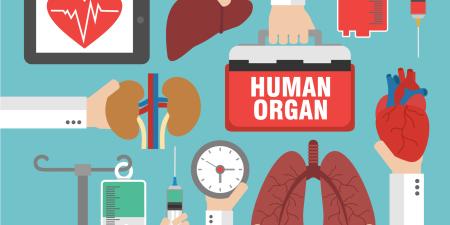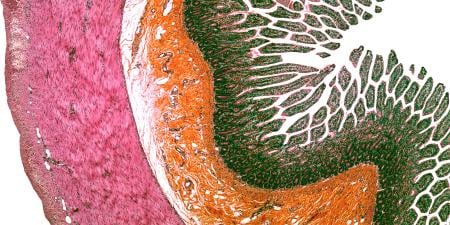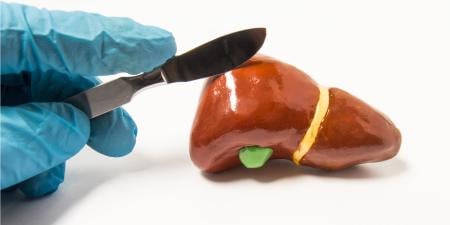Case
In a small town in Maine, a school board gathered for its monthly meeting. Dr. Gomez, present at the meeting, had practiced family medicine in this town for more than 25 years and his three children had gone through the local school system.
Weeks before, a serious car crash involved several high school students and resulted in the death of an 18-year-old boy, Keith. Talk of the crash and death consumed the “new business” portion of the evening.
Towards the end of the discussion, a pair of parents slowly rose in the back of the gym.
“Our daughter Stephanie has been lying in a hospital bed for the past 13 weeks. She is there because she is dying of end-stage liver disease; the only thing that will save her now is a liver transplant. We recognize the tragedy of Keith’s death and we are hoping to take this moment to raise awareness about organ donation.” Keith had not listed himself as an organ donor on his license.
“It is never easy when a family or our community confronts such heartbreak as this terrible accident. It would have been possible, however, for good to have come from Keith’s organs. There is a tremendous shortage. Donating your organs is the ultimate gift—the gift of life for desperately ill people.”
This emotional plea sparked a fervent debate among parents. Many left wondering whether conversations like these had a place at school board meetings or in schools themselves. Many in the community turned to Dr. Gomez for his opinion. Did he believe in educating patients about organ donation? He could bring it up at yearly physicals, as he did with advance directives—why didn’t he? Did he think it was an appropriate topic for a public forum?
Commentary
In the aftermath of a seemingly heated public debate about organ donation at a school board meeting, Dr. Gomez faces difficult questions related to physicians’ moral obligations to promote the well-being of patients and society. This case raises three main questions. First, do family physicians have a moral responsibility to educate patients about organ donation? Second, should organ donation be discussed at yearly physicals, following the model of discussions about advance directives? Finally, do physicians have a moral obligation to discuss organ donation in public forums as part of a professional commitment to social responsibility? These questions are undoubtedly important and familiar, reflecting dilemmas faced by many doctors. In this commentary, we will address these questions and argue that, as part of the oath taken to promote patient health, doctors have a moral obligation to promote community health because of the links between community and individual health.
In meeting their ethical responsibilities, physicians are obliged to promote the best interests of patients in their immediate care and to advocate for the health of society at large, which encompasses all potential patients. Established theories of medical ethics describe physicians as being professionally bound by four principles: beneficence (promotion of the health of patients and the public), nonmaleficence (not harming patients), respect for autonomy (promotion of patient self-determination), and justice (promotion of equitable distribution of life-enhancing treatments) [1]. In fulfilling their obligation to promote health and well-being, physicians should be inclined to discuss donation in an attempt to increase donation rates and mitigate the organ shortage. Promoting organ donation serves both individual patients, who very well may need an organ, and society, by decreasing the financial and human costs of many life-threatening conditions.
Organ Donation in the United States
The scarcity of and waiting times for routine health care treatments in the United States generally decrease as their usage spreads, but waiting time for organ transplants has grown in recent years and is projected to increase further due to rising demand and stagnant donation rates. This creates a growing public health concern—18 Americans die every day waiting for an organ.
Two factors underlie the organ shortage: a limited pool of eligible donors and difficulty converting eligible donors into actual donors. Despite expansion of the donor eligibility criteria, the availability of deceased-donor organs is finite and cannot meet current demand. The pool of potential brain-dead donors is thought to be approximately 15,000 per year [2]. The conversion rate (potential donors who actually donate organs) is estimated to be between one-third and one-half [3, 4]. Of families approached about organ donation in hospitals, less than half agree to donate [5, 6]. Increasing the number of willing prospective donors and those who actually donate, however, is possible. More importantly, donor registration and conversion of prospective to actual donors are strongly influenced by encounters with medical teams and discussions about preferences for end-of-life care.
Although the public is generally supportive of organ donation, less than 30 percent of Americans are registered organ donors [7]. Consent to organ donation can occur in ICUs or hospitals in acute situations of impending death, or in nonmedical settings, such as at the Registry of Motor Vehicles or online. While these venues present good opportunities for donor registration, people may feel that they do not have adequate time or information to consider the benefits and ramifications of organ donation fully. This may be particularly true for those considering organ donation in nonmedical settings, as they are often forced to decide about donation without the ability to discuss their options with a trusted and knowledgeable advisor. Lack of discussion with patients about the implications of organ donation overlooks an opportunity to educate them about donation and dispel misconceptions related to organ donation and transplantation.
Should Family Physicians Educate Patients about Organ Donation?
Do physicians have a moral obligation to educate patients about donation and discuss this option? They do, insofar as informing patients about organ donation fulfills their duties of beneficence, respect for autonomy, and justice. If we adopt the World Health Organization’s definition of health, “a state of complete physical, mental, and social well-being and not merely the absence of disease or infirmity” [8], it becomes clear that promoting organ donation and altruistic behavior while encouraging action that is consistent with the patient’s worldview is an integral part of health promotion.
Shared decision making, in its simplest interpretation, places the physician in the role of imparting value-free scientific information based on his or her expertise and training, to educate the patient about the risks and benefits associated with each treatment option. In this dynamic, the patient has the responsibility to provide the moral compass and tailor the decision to his or her conception of the good. Although these conditions are necessary for shared decision making, they are not sufficient.
But, as Dan Brock and others suggest, shared decision making does notrequire value-neutrality of physicians [9]. Instead, physicians are ethically obligated to advocate on behalf of their patients and promote their health and well-being, while preserving their autonomy and self-determination. Even seemingly straightforward health promotion, as conventionally practiced, is often value-laden. It suggests, for example, that restoring function is good, even if it requires invasive interventions. This may be in stark contrast to conceptions of the good held by a patient, who may, for example, believe that preserving the sanctity of the body is more important than such interventions. In the context of organ donation, these principles imply that family physicians (and other doctors) have the obligation to educate patients about organ donation in an effort to provide information necessary to making a decision about donation. Furthermore, because a patient’s future need for an organ is unknown, it is in all patients’ best interest to mitigate the organ shortage by increasing donation rates.
Discussing organ donation with a physician, particularly a primary care physician (PCP), could significantly benefit patients for four reasons. First, PCPs have an established relationship of trust with patients, stemming from multiple discussions about delicate medical matters, often over the course of many years. As a result, they may be more aware of the patient’s cultural and moral preferences and can better tailor information and engage in shared decision making. For example, despite needing kidneys at a disproportionately high rate, African-Americans are far less likely to be registered donors [10]. This may be due, in part, to misinformation about the risks and benefits of donation, not being presented with the opportunity to donate (particularly in acute situations), and higher levels of distrust attributed to institutionalized racism. Tailored interventions, such as culturally sensitive discussions with a PCP about organ donation and end-of-life care preferences, could help to alleviate disparities by ensuring more equitable information about care options.
Second, as Thornton et al. suggest, the ambulatory setting may be particularly well suited for discussions about organ donation because people under the age of 50, who comprise over a third of deceased organ donors, utilize ambulatory services at disproportionately high rates [11]. Third, PCPs have successfully engaged in difficult conversations about end-of-life care that have increased the number of patients who completed advance directives [12, 13]. Finally, for patients, designating donor status allows them to preserve their autonomy by documenting and communicating their wishes in case situations arise in which they cannot do so. Such peace of mind is important and allows people to feel confident that their end-of-life treatment will be consistent with their wishes and their worldview.
Discussion about organ donation can greatly benefit patients’ families too. Advance planning helps surrogates, relieving them of the burden of making such difficult decisions under stress. Discussions about donation occur in situations of extreme grief and uncertainty. Numerous studies have demonstrated that prior knowledge of the deceased’s preferences help families heal by maintaining unity and confidence in the decision [14].
PCPs have ethical grounds to be concerned with and discuss the organ donation status of their patients—the principles of beneficence, respect for autonomy, and justice all require it.
Discussing Organ Donation in Public Forums
The physician’s moral obligation to promote the health and well-being of his or her patient and to respect patient autonomy may flow readily from the principles of beneficence and nonmaleficence. This is a well-accepted tenet of the physician’s ethical conduct. However, Dr. Gomez, and many other physicians, may wonder whether they are morally obligated as medical professionals to advocate publicly for health improvement. More specifically, are physicians morally obligated to advocate for organ donationpublicly, and, if so, what is their role in this debate?
To better understand physicians’ ethical obligations, we turn to the concept of the social contract between medicine and society. Sylvia and Richard Cruess write that the social contract “granted physicians status, respect, autonomy in practice, the privilege of self-regulation, and financial rewards on the expectation that physicians would be competent, altruistic, moral, and would address the health care needs of individual patients and society” [15].
The core of the relationship between the medical profession and society entails that physicians act as advocates of public health. Reaffirming this social contract, in their role in establishing guidelines of medical professionalism, the Accreditation Council for Graduate Medical Education (ACGME)’s “professionalism” competency requires, among other things, that physicians demonstrate “accountability to patients [and] society” [16]. The American Medical Association, in its declaration of professional responsibility, encourages physicians to “advocate for social, economic, educational, and political changes that ameliorate suffering and contribute to human well-being” [17]. The social contract between medicine and society, as well as the well-documented effects of social determinants on individual health, compel physicians to act in a way that promotes equity and enhances the chances of all persons to live a healthy life.
Policy Recommendations
Many legislative and regulatory initiatives have aimed to improve rates of consent for donation. These include the Uniform Anatomical Gift Act (UAGA), Medicare coverage and federal oversight of transplantation, the National Organ Transplantation Act (NOTA), and required request laws (necessary for the Joint Commission on Accreditation of Health Care Organizations hospital accreditation and Medicare reimbursement). Despite these efforts, donation rates remain low.
What prevents people from donating? Many studies suggest that the reasons are multifactorial, and include lack of information about donation, misperceptions related to organ procurement (e.g., that doctors may try less hard to save the lives of organ donors, that donors will be unable to have an open casket), and negative perceptions of medical treatment or organ procurement workers. Doctors, too, may have negative attitudes about and discomfort with discussing donation with patients. Many of these factors can be overcome by training physicians to have effective and sensitive discussions about end-of-life care with patients.
References
-
Beauchamp TL, Childress JF. Principles of Biomedical Ethics. 5th ed. New York: Oxford University Press; 2001.
- Nathan HM, Conrad SL, Held PJ, et al. Organ donation in the United States. Am J Transplant. 2003;3(Suppl 4):29-40.
- Gortmaker SL, Beasley CL, Brigham LE, et al. Organ donor potential and performance: size and nature of the organ donor shortfall. Crit Care Med. 1996;24(3):432-439.
- Sheehy E, Conrad SL, Brigham LE, et al. Estimating the number of potential organ donors in the United States. N Engl J Med. 2003;349(7):667-674.
- Siminoff LA, Arnold RM, Caplan AL, Virnig BA, Seltzer DL. Public policy governing organ and tissue procurement in the United States. Results from the National Organ and Tissue Procurement Study. Ann Intern Med. 1995;123(1):10-17.
- Siminoff LA, Arnold RM, Hewlett J. The process of organ donation and its effect on consent. Clin Transplant. 2001;15(1):39-47.
-
US Department of Health and Human Services. The need is real: data. http://organdonor.gov/about/data.html. Accessed February 16, 2012.
-
World Health Organization. Frequently asked questions. http://www.who.int/suggestions/faq/en/index.html. Accessed February 16, 2012.
- Brock DW. The ideal of shared decision making between physicians and patients. Kennedy Inst Ethics J. 1991;1(1):28-47.
- Lunsford SL, Shilling LM, Chavin KD, et al. Racial differences in the living kidney donation experience and implications for education. Prog Transplant. 2007;17(3):234-240.
- Thornton JD, Curtis JR, Allen MD. Completion of advanced care directives is associated with willingness to donate. J Natl Med Assoc. 2006;98(6):897-904.
- Gordon N, Shade S. Advance directives are more likely among seniors asked about end-of-life care preferences. Arch Intern Med. 1999;159(7):701-704.
- Tierney WM, Dexter PR, Gramelspacher GP, Perkins AJ, Zhou ZH, Wolinsky FD. The effect of discussions about advance directives on patients’ satisfaction with primary care. J Gen Intern Med. 2001;16(1):32-40.
- Rodrigue J, Cornell DL, Howard RJ. Organ donation decision: comparison of donor and nondonor families. Am J Transplant. 2006;6(1):190-198.
-
Cruess S, Cruess R. Professionalism and medicine’s social contract with society. Virtual Mentor. 2004;6(4). http://virtualmentor.ama-assn.org/2004/04/msoc1-0404.html. Accessed February 16, 2012.
-
Swing SR. The ACGME outcome project: retrospective and prospective. Med Teach. 2007;29(7):649. http://www.paeaonline.org/index.php?ht=a/GetDocumentAction/id/110022. Accessed February 16, 2012.
-
American Medical Association. Declaration of Professional Responsibility: Medicine’s Social Contract With Humanity. 2001. http://www.ama-assn.org/resources/doc/ethics/decofprofessional.pdf. Accessed February 16, 2012.



